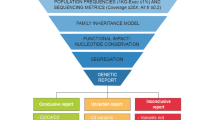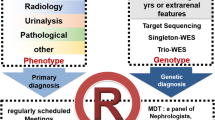Abstract
Background
Inherited kidney diseases are a common cause of chronic kidney disease (CKD) in children. Identification of a monogenic cause of CKD is more common in children than in adults. This study evaluated the diagnostic yield and phenotypic spectrum of children who received genetic testing through the KIDNEYCODE sponsored genetic testing program.
Methods
Unrelated children < 18 years of age who received panel testing through the KIDNEYCODE sponsored genetic testing program from September 2019 through August 2021 were included (N = 832). Eligible children met at least one of the following clinician-reported criteria: estimated GFR ≤ 90 ml/min/1.73 m2, hematuria, a family history of kidney disease, or suspected or biopsy confirmed Alport syndrome or focal segmental glomerulosclerosis (FSGS) in the tested individual or family member.
Results
A positive genetic diagnosis was observed in 234 children (28.1%, 95% CI [25.2–31.4%]) in genes associated with Alport syndrome (N = 213), FSGS (N = 9), or other disorders (N = 12). Among children with a family history of kidney disease, 30.8% had a positive genetic diagnosis. Among those with hematuria and a family history of CKD, the genetic diagnostic rate increased to 40.4%.
Conclusions
Children with hematuria and a family history of CKD have a high likelihood of being diagnosed with a monogenic cause of kidney disease, identified through KIDNEYCODE panel testing, particularly COL4A variants. Early genetic diagnosis can be valuable in targeting appropriate therapy and identification of other at-risk family members.
Graphical abstract
A higher resolution version of the Graphical abstract is available as Supplementary information




Similar content being viewed by others
References
KDIGO Conference Participants (2022) Genetics in chronic kidney disease: conclusions from a kidney disease: improving global outcomes (KDIGO) controversies conference. Kidney Int 101:1126–1141. https://doi.org/10.1016/j.kint.2022.03.019
Bullich G, Domingo-Gallego A, Vargas I et al (2018) A kidney-disease gene panel allows a comprehensive genetic diagnosis of cystic and glomerular inherited kidney diseases. Kidney Int 94:363–371. https://doi.org/10.1016/j.kint.2018.02.027
Mrug M, Bloom MS, Seto C et al (2021) Genetic testing for chronic kidney diseases: clinical utility and barriers perceived by Nephrologists. Kidney Med 3:1050–1056. https://doi.org/10.1016/j.xkme.2021.08.006
Vehaskari VM, Rapola J, Koskimies O, Savilahti E, Vilska J, Hallman N (1979) Microscopic hematuria in school children: epidemiology and clinicopathologic evaluation. J Pediatr 95:676–684. https://doi.org/10.1016/s0022-3476(79)80710-6
Lieberman K, Chang A, Block G et al (2022) The KIDNEYCODE program: diagnostic yield and clinical features of individuals with chronic kidney disease. Kidney360 3:900–909. https://doi.org/10.34067/KID.0004162021
Groopman EE, Marasa M, Cameron-Christie S et al (2019) Diagnostic utility of exome sequencing for kidney disease. N Engl J Med 380:142–151. https://doi.org/10.1056/NEJMoa1806891
Kashtan CE, Ding J, Garosi G et al (2018) Alport syndrome: a unified classification of genetic disorders of collagen IV alpha345: a position paper of the Alport Syndrome Classification Working Group. Kidney Int 93:1045–1051. https://doi.org/10.1016/j.kint.2017.12.018
Jais JP, Knebelmann B, Giatras I et al (2000) X-linked Alport syndrome: natural history in 195 families and genotype- phenotype correlations in males. J Am Soc Nephrol 11:649–657. https://doi.org/10.1681/ASN.V114649
Oka M, Nozu K, Kaito H et al (2014) Natural history of genetically proven autosomal recessive Alport syndrome. Pediatr Nephrol 29:1535–1544
Furlano M, Martinez V, Pybus M et al (2021) Clinical and genetic features of autosomal dominant Alport syndrome: a cohort study. Am J Kidney Dis 78:560-570.e1. https://doi.org/10.1007/s00467-014-2797-4
Savige J, Colville D, Rheault M et al (2016) Alport syndrome in women and girls. Clin J Am Soc Nephrol 11:1713–1720. https://doi.org/10.2215/CJN.00580116
Gast C, Pengelly RJ, Lyon M et al (2016) Collagen (COL4A) mutations are the most frequent mutations underlying adult focal segmental glomerulosclerosis. Nephrol Dial Transplant 31:961–970. https://doi.org/10.1093/ndt/gfv325
Malone AF, Phelan PJ, Hall G et al (2014) Rare hereditary COL4A3/COL4A4 variants may be mistaken for familial focal segmental glomerulosclerosis. Kidney Int 86:1253–1259. https://doi.org/10.1038/ki.2014.305
Pierides A, Voskarides K, Athanasiou Y et al (2009) Clinico-pathological correlations in 127 patients in 11 large pedigrees, segregating one of three heterozygous mutations in the COL4A3/ COL4A4 genes associated with familial haematuria and significant late progression to proteinuria and chronic kidney disease from focal segmental glomerulosclerosis. Nephrol Dial Transplant 24:2721–2729. https://doi.org/10.1093/ndt/gfp158
Gross O, Licht C, Anders HJ et al (2012) Early angiotensin-converting enzyme inhibition in Alport syndrome delays renal failure and improves life expectancy. Kidney Int 81:494–501. https://doi.org/10.1038/ki.2011.407
Yamamura T, Horinouchi T, Nagano C et al (2020) Genotype-phenotype correlation and the influence of the genotype on response to angiotensin-targeting drugs in Japanese patients with male X-linked Alport syndrome. Kidney Int 98:1605–1614. https://doi.org/10.1016/j.kint.2020.06.038
Zhang Y, Bockhaus J, Wang F et al (2021) Genotype-phenotype correlations and nephroprotective effects of RAAS inhibition in patients with autosomal recessive Alport syndrome. Pediatr Nephrol 36:2719–2730. https://doi.org/10.1007/s00467-021-05040-9
Gross O, Tönshoff B, Weber LT et al (2020) A multicenter, randomized, placebo-controlled, double-blind phase 3 trial with open-arm comparison indicates safety and efficacy of nephroprotective therapy with ramipril in children with Alport’s syndrome. Kidney Int 97:1275–1286. https://doi.org/10.1016/j.kint.2019.12.015
Kashtan CE, Gross O (2021) Clinical practice recommendations for the diagnosis and management of Alport syndrome in children, adolescents, and young adults-an update for 2020. Pediatr Nephrol 36:711–719. https://doi.org/10.1007/s00467-020-04819-6
Connaughton DM, Hildebrandt F (2020) Personalized medicine in chronic kidney disease by detection of monogenic mutations. Nephrol Dial Transplant 35:390–397. https://doi.org/10.1093/ndt/gfz028
Connaughton DM, Kennedy C, Shril S et al (2019) Monogenic causes of chronic kidney disease in adults. Kidney Int 95:914–928. https://doi.org/10.1016/j.kint.2018.10.031
Ottlewski I, Münch J, Wagner T et al (2019) Value of renal gene panel diagnostics in adults waiting for kidney transplantation due to undetermined end-stage renal disease. Kidney Int 96:222–230. https://doi.org/10.1016/j.kint.2019.01.038
Lata S, Marasa M, Li Y et al (2018) Whole-exome sequencing in adults with chronic kidney disease: a pilot study. Ann Intern Med 168:100–109. https://doi.org/10.7326/M17-1319
Jayasinghe K, Stark Z, Kerr PG et al (2021) Clinical impact of genomic testing in patients with suspected monogenic kidney disease. Genet Med 23:183–191. https://doi.org/10.1038/s41436-020-00963-4
Morinière V, Dahan K, Hilbert P et al (2014) Improving mutation screening in familial hematuric nephropathies through next generation sequencing. J Am Soc Nephrol 25:2740–2751. https://doi.org/10.1681/ASN.2013080912
Cirillo L, Becherucci F (2022) Genetic testing in nephrology: show your pedigree! Kidney360 3:2148–2152. https://doi.org/10.34067/KID.0002732022
Author information
Authors and Affiliations
Corresponding author
Ethics declarations
Conflict of interest
MNR is a site PI for Reata, Chinook, Travere, and Sanofi and a consultant for Visterra, Horizon, and ENYO Pharma. HMM, AM, and LB are current or former employees and stockholders of Invitae® Corporation. PD is on the medical advisory board for Alnylam, Dicerna, Reata, and Bioporto. BAW is a consultant for Reata, Bayer, Roche and Amgen. KG is a consultant for Travere, Aurinia, and Reata. KVL has received honoraria from Reata.
Additional information
Publisher's note
Springer Nature remains neutral with regard to jurisdictional claims in published maps and institutional affiliations.
Supplementary information
Below is the link to the electronic supplementary material.
Rights and permissions
Springer Nature or its licensor (e.g. a society or other partner) holds exclusive rights to this article under a publishing agreement with the author(s) or other rightsholder(s); author self-archiving of the accepted manuscript version of this article is solely governed by the terms of such publishing agreement and applicable law.
About this article
Cite this article
Rheault, M.N., McLaughlin, H.M., Mitchell, A. et al. COL4A gene variants are common in children with hematuria and a family history of kidney disease. Pediatr Nephrol 38, 3625–3633 (2023). https://doi.org/10.1007/s00467-023-05993-z
Received:
Revised:
Accepted:
Published:
Issue Date:
DOI: https://doi.org/10.1007/s00467-023-05993-z




